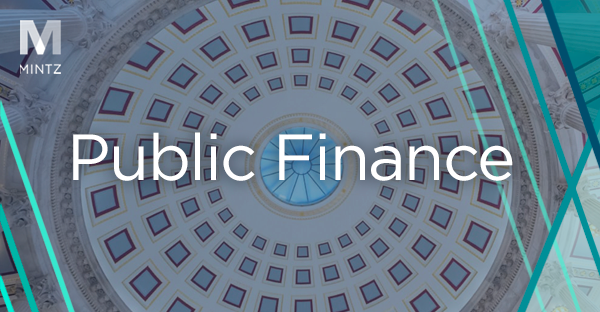
Bankruptcy & Restructuring
Viewpoints
Filter by:
Small Business Chapter 11 Eligibility Expanded Under CARES Act
April 2, 2020 | Blog
President Trump signed the Small Business Reorganization Act of 2019 (the “SBRA”) into law in August of last year and it became effective on February 20, 2020. The SBRA amended the U.S. Bankruptcy Code and is designed to simplify and shorten the reorganization process for “small businesses” and to make the entire process more cost effective.
Read more
The Coronavirus Aid, Relief, and Economic Security Act: Assistance Available to Passenger Airlines and Airports
March 31, 2020 | Blog | By Tim McKeon, William Kannel
On March 27, 2020, President Trump signed into law the “Coronavirus Aid, Relief, and Economic Security Act” (the “CARES Act”), a $2+ trillion stimulus package intended to ease the economic and social disruptions facing the country in the wake of the COVID-19 outbreak.
Read more
Congress Acts to Mitigate COVID-19 Impact
March 18, 2020 | Blog | By Anthony DeMaio, William Kannel
Below is an update on legislative efforts by Congress and the White House to address the coronavirus pandemic, prepared by our D.C. colleagues at ML Strategies, who are closely following these fluid and fast-moving developments. Efforts to provide a supply of low cost working capital to the many businesses and entities experiencing operational and/or cash flow disruption may be of particular interest to our bondholder clients.
Read more
Are Bankruptcy Blocking Provisions in Corporate Governance Documents Enforceable?
October 24, 2019 | Blog
Many equity sponsors are both shareholders and lenders to their portfolio companies. In that hybrid case, where the shareholder is also a creditor, can the shareholder enforce corporate governance provisions which restrict the ability of the company to file for bankruptcy? A recent decision from the Fifth Circuit Court of Appeals has answered that question in the affirmative - with caveats.
Read more
THE FIFTH CIRCUIT ADOPTS AN EXPANSIVE READING OF SECTION 510(b); SUBORDINATES CLAIM WITH ‘EQUITY CHARACTERISTICS’
October 1, 2019 | Blog | By Andrew B. Levin
In French v. Linn Energy, L.L.C. (In re Linn Energy, L.L.C.), the United States Court of Appeals for the Fifth Circuit addressed the scope of Bankruptcy Code Section 510(b), settling on an expansive reading of the Section, holding that a claim for “deemed dividends” should be subordinated.
Read more
The Risks of Imperfect Perfection, and How to Avoid Them
September 25, 2019 | Blog
Changes to Preference Practices Under New Bankruptcy Law
September 4, 2019 | Blog | By Tim McKeon
Decade Old Transactions Potentially Subject to Bankruptcy Clawback in Massachusetts
August 15, 2019 | Blog | By Eric Blythe
Transfers and transactions up to ten years old may be scrutinized, unwound and recovered by a trustee, the bankruptcy court sitting in Massachusetts recently held in the NECCO (think chalky wafer candy) bankruptcy case. The ruling, in a case of first impression in Massachusetts, expands the reach back period from the typical four-year period for fraudulent transfer recovery, so long as the IRS is a creditor in the case.
Read more
Supreme Court Adopts a “Rejection-as-Breach” Rule to Allow Licensee to Continue to Use Trademark Following Debtor’s Rejection of License
May 29, 2019 | Blog | By Tim McKeon
On May 20, 2019, the United States Supreme Court ruled that a debtor-licensor’s ‘rejection’ of a trademark license agreement under section 365 of the Bankruptcy Code does not terminate the licensee’s rights to continue to use the trademark. The decision, issued in Mission Product Holdings, Inc. v. Tempnology, LLC, resolved a split among the Circuits, but may spawn additional issues regarding non-debtor contractual rights in bankruptcy.
Read more
Health Care Fraud Investigations and Litigation Offer Unexpected Lessons for Bankruptcy Counsel
April 25, 2019 | Blog | By Samantha Kingsbury
As many of our readers know, we have been closely following the Polukoff False Claims Act (FCA) qui tam case in the Tenth Circuit for the lessons it might offer in defending FCA cases premised on allegations related to lack of medical necessity (among other topics). Recently, we had the opportunity to consider this case from a different angle: the lessons it might offer to bankruptcy counsel advising clients who are or have been the subject of a health care fraud investigation and/or FCA qui tam case.
Read more
First Circuit Rules That “Incorporation by Reference” of Collateral Description in UCC Financing Statements May Not Perfect Lien
February 14, 2019 | Blog | By William Kannel, Eric Blythe
Tolstoy warned that “if you look for perfection, you’ll never be content”; but Tolstoy wasn’t a bankruptcy lawyer. In the world of secured lending, perfection is paramount. A secured lender that has not properly perfected its lien can lose its collateral and end up with unsecured status if its borrower files bankruptcy.
Read more
The Delaware Bankruptcy Court Grapples With Section 546(e) Post-Merit Management
January 18, 2019 | Blog | By Andrew B. Levin
In its ruling in FTI Consulting, Inc. v. Sweeney (In re Centaur, LLC), the United States Bankruptcy Court for the District of Delaware addressed the Supreme Court’s recent clarification of the scope of Bankruptcy Code Section 546(e)’s “safe harbor” provision, affirming a more narrow interpretation of Section 546(e).
Read more
Supreme Court to Decide Whether Debtors Can Terminate a Licensee’s Rights to Trademarks under License Agreements
December 7, 2018 | Blog | By Tim McKeon
Protecting Creditor Rights in Insolvency Proceedings
August 27, 2018 | Video | By Joseph Dunn
Joe Dunn discusses the importance of creditors taking action to protect their interests when dealing with a distressed company and the tools available to businesses in order to do so.
Read more
Ninth Circuit: No Ulterior Motive, No Bad Faith When Buying Claims to Block Confirmation
July 24, 2018 | Blog
A recent Ninth Circuit Court of Appeals decision provides insight into “bad faith” claims-buying activity; specifically whether a creditor’s purchase of claims for the express purpose of blocking plan confirmation is permissible.
Read more
Non-Debtor Substantive Consolidation: Do Recent Cases Signal a Judicial Preference for State Law Claims?
July 11, 2018 | Blog
It is not unusual for a creditor of a debtor to cry foul that a non-debtor affiliate has substantial assets, but has not joined the bankruptcy.
Read more
Supreme Court Bankruptcy Thoughts: Scope of Safe Harbor and Appellate Review
May 3, 2018 | Blog | By Sarah Ramuta
The Supreme Court recently addressed two bankruptcy issues. In its Merit Management opinion, the Court resolved a circuit split regarding the breadth of the safe harbor provision which protects certain transfers by financial institutions in connection with a securities contract.
Read more
Checking-In: Chapter 9, Chapter 11 or Ineligible?
February 23, 2018 | Blog | By William Kannel
Last week, President Trump unveiled his proposal to fix our nation’s aging infrastructure. While the proposal lauded $1.5 trillion in new spending, it only included $200 billion in federal funding. To bridge this sizable gap, the plan largely relies on public private partnerships (often referred to as P3s) that can use tax-exempt bond financing.
Read more
The First Circuit Casts a Shadow on Sunbeam
February 12, 2018 | Blog | By Amanda M. Blaske
In the recently decided case, Mission Product Holdings, Inc. v. Tempnology, LLC, the United States Court of Appeals for the First Circuit took a hardline position that trademark license rights are not protected in bankruptcy. Bankruptcy Code section 365(n) permits a licensee to continue to use intellectual property even if the debtor rejects the license agreement.
Read more
In Massachusetts, Directors and Investors Acting in their Normal Capacities Do Not Have Personal Liability for Wage Act Violations
February 8, 2018 | Blog
The Massachusetts Supreme Judicial Court recently held that the Massachusetts Wage Act does not impose personal liability on board members or investors acting in their normal capacities.
Read more
Explore Other Viewpoints:
- Data Centers & Digital Infrastructure
- AI: The Washington Report
- Antitrust
- Appellate
- Arbitration, Mediation & Alternate Dispute Resolution
- Artificial Intelligence
- Awards
- Bankruptcy & Restructuring
- California Land Use
- Cannabis
- Class Action
- Complex Commercial Litigation
- Construction
- Consumer Product Safety
- Corporate Governance (ESG)
- Cross-Border Asset Recovery
- DEI Legal Developments
- Debt Financing
- Direct Investing (M&A)
- Diversity
- EB-5 Financing
- Education & Nonprofits
- Employment
- EnforceMintz
- Environmental (ESG)
- Environmental Enforcement Defense
- Environmental Law
- Environmental, Social, and Corporate Governance (ESG)
- FDA Regulatory
- False Claims Act
- Federal Circuit Appeals
- Financial Institution Litigation
- Government Law
- Growth Equity
- Health Care
- Health Care Compliance, Fraud and Abuse, & Regulatory Counseling
- Health Care Enforcement & Investigations
- Health Care Transactions
- Health Information Privacy & Security
- IP Due Diligence
- IPRs & Other Post Grant Proceedings
- Immigration
- Impacts of a New US Administration
- Insolvency & Creditor Rights Litigation
- Institutional Investor Class Action Recovery
- Insurance & Financial Services
- Insurance Consulting & Risk Management
- Insurance and Reinsurance Problem-Solving & Dispute Resolution
- Intellectual Property
- Investment Funds
- Israel
- Licensing & Technology Transactions
- Life Sciences
- Litigation & Investigations
- M&A Litigation
- ML Strategies
- Medicare, Medicaid and Commercial Coverage & Reimbursement
- Mergers & Acquisitions
- Patent Litigation
- Patent Prosecution & Strategic Counseling
- Pharmacy Benefits and PBM Contracting
- Portfolio Companies
- Privacy & Cybersecurity
- Private Client
- Private Equity
- Pro Bono
- Probate & Fiduciary Litigation
- Products Liability & Complex Tort
- Projects & Infrastructure
- Public Finance
- Real Estate Litigation
- Real Estate Transactions
- Real Estate, Construction & Infrastructure
- Retail & Consumer Products
- Securities & Capital Markets
- Securities Litigation
- Social (ESG)
- Special Purpose Acquisition Company (SPACs)
- Sports & Entertainment
- State Attorneys General
- Strategic IP Monetization & Licensing
- Sustainable Energy & Infrastructure
- Tax
- Technology
- Technology, Communications & Media
- Technology, Communications & Media Litigation
- Trade Secrets
- Trademark & Copyright
- Trademark Litigation
- Unified Patent Court (UPC)
- Value-Based Care
- Venture Capital & Emerging Companies
- White Collar Defense & Government Investigations
- Women's Health and Technology






